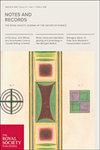岩石、头骨和物质主义:格鲁吉亚贝尔法斯特晚期的地质学和颅相学
IF 0.6
3区 哲学
Q3 HISTORY & PHILOSOPHY OF SCIENCE
Notes and Records-The Royal Society Journal of the History of Science
Pub Date : 2017-11-22
DOI:10.1098/rsnr.2017.0023
引用次数: 1
摘要
近年来,人们对19世纪科学自然主义的出现有了更细致的理解。很明显,科学自然主义在查尔斯·达尔文的《物种起源论》(1859年)出版后的几年里并没有出现,而是在本世纪更早的时候出现了,即使只是刚刚出现。在最近学术研究的基础上,本文采用了一种以地理为重点的方法,探讨了格鲁吉亚贝尔法斯特晚期关于地质学和颅相学的辩论——这两种不同形式的知识有助于科学自然主义。贝尔法斯特为约翰·廷德尔1874年作为英国科学促进会主席发表臭名昭著的演讲提供了场所,在19世纪科学自然主义的故事中占据了中心地位。然而,在揭示科学知识在贝尔法斯特获得或被剥夺认知和公民可信度的复杂而令人惊讶的方式时,这场讨论将表明,早在廷德尔干预之前,自然主义、唯物主义以及科学与宗教之间的关系就已经是该镇的公共辩论问题。本文章由计算机程序翻译,如有差异,请以英文原文为准。
Rocks, skulls and materialism: geology and phrenology in late-Georgian Belfast
Recent years have seen the development of a more nuanced understanding of the emergence of scientific naturalism in the nineteenth century. It has become apparent that scientific naturalism did not emerge sui generis in the years following the publication of Charles Darwin's On the origin of species (1859), but was present, if only in incipient form, much earlier in the century. Building on recent scholarship, this article adopts a geographically focused approach and explores debates about geology and phrenology—two of the diverse forms of knowledge that contributed to scientific naturalism—in late-Georgian Belfast. Having provided the venue for John Tyndall's infamous 1874 address as president of the British Association for the Advancement of Science, Belfast occupies a central place in the story of nineteenth-century scientific naturalism. However, in uncovering the intricate and surprising ways in which scientific knowledge gained, or was denied, epistemic and civic credibility in Belfast, this discussion will demonstrate that naturalism, materialism and the relationship between science and religion were matters of public debate in the town long before Tyndall's intervention.
求助全文
通过发布文献求助,成功后即可免费获取论文全文。
去求助
来源期刊
CiteScore
1.50
自引率
0.00%
发文量
45
审稿时长
>12 weeks
期刊介绍:
Notes and Records is an international journal which publishes original research in the history of science, technology and medicine.
In addition to publishing peer-reviewed research articles in all areas of the history of science, technology and medicine, Notes and Records welcomes other forms of contribution including: research notes elucidating recent archival discoveries (in the collections of the Royal Society and elsewhere); news of research projects and online and other resources of interest to historians; essay reviews, on material relating primarily to the history of the Royal Society; and recollections or autobiographical accounts written by Fellows and others recording important moments in science from the recent past.

 求助内容:
求助内容: 应助结果提醒方式:
应助结果提醒方式:


